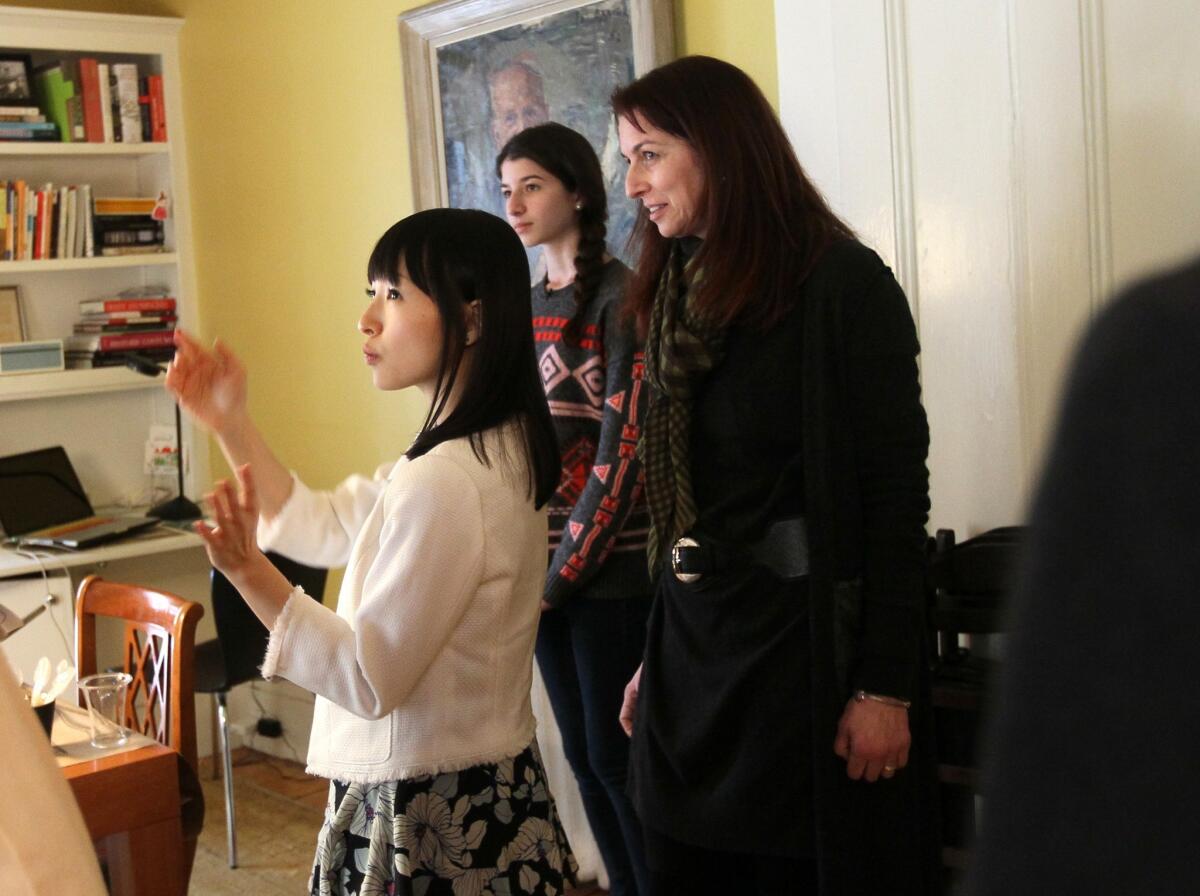Op-Ed: The life-changing magic of sharing housework

Marie Kondo, left, author and tidiness guru, tells Claudia Logan and her daughter, Otti, that there is much joy in their dining room/office.
- Share via
A de-cluttering trend is sweeping the nation. Old sweaters and unread books have been put on notice: They’re not safe in the attic anymore, they’re destined for the curb, and it’s all thanks to a Japanese woman named Marie Kondo. In her bestselling book, “The Life-Changing Magic of Tidying Up,” published in English in late 2014, Kondo elevated the annual closet purge to a Zen-like experience. Last week, she published a companion text called “Spark Joy: An Illustrated Master Class on the Art of Organizing and Tidying Up.”
Although Kondo — who refers to herself as KonMari — and her fervent fans certainly spark feelings within me, joy is not among them. Concern is more like it. You see, I’ve noticed something peculiar about her acolytes: They’re virtually all female. Indeed, New York magazine reported that the majority of Kondo’s clients are women. At least in America, if not in Japan, “Kondoing” your home is a feminized phenomenon.
Statistically speaking, women take on more domestic responsibilities than their male partners. In the United States, women spend an average of two hours more on chores per week.
Why are 21st century American women — who, generally speaking, are righteously angry about continuing disparities in household labor — flocking to a guru who promises to improve their organizational techniques?
Kondo’s pitch isn’t all that different from what you’d expect to find in a Container Store ad: A neat home is a happy home. But Kondo offers her tips with a side of existential advice. She counsels that “the best way to choose what to keep and what to throw away is to take each item in one’s hand and ask: ‘Does this spark joy?’ If it does, keep it. If not, dispose of it.”
Because Kondo cloaks her de-cluttering instructions in philosophical language and drops references to concepts such as the “sunk-cost fallacy,” America’s women have failed to notice that she’s selling them Good Housekeeping 2.0. “Tidying is the act of confronting yourself,” Kondo writes in her new book. “Cleaning is the act of confronting nature.”
That’s pithy, but it elides the fact that, for women who live with men or children, both tidying and cleaning are really acts of confronting other people — specifically, other people’s messes.
Statistically speaking, women take on more domestic responsibilities than their male partners. In the United States, women spend an average of two hours more on chores a week. In one British survey, men acknowledged deliberately doing a poor job of cleaning the toilet, loading the dishwasher and vacuuming so that their female partners would be more inclined to just tackle those chores themselves. That survey was from 2014, not 1964. Even the most equality-minded heterosexual couples can find themselves defaulting to familiar roles when it comes to the mundane tasks of homemaking. She does the laundry; he takes out the trash.
Few reviews of the KonMari phenomenon or interviews with the tidiness guru point out how gendered the quest for household cleanliness remains, even in an era when most women work outside the home, too. Whereas other hipster trends, such as the rise in home cooking as an artful hobby, have nudged men to share historically female domestic burdens, the KonMari fad seems to be having the opposite effect. It’s making women forget that cleaning is a chore and — insanely — embrace it as a path to liberation.
Some counterprogramming is in order, and perhaps the wake-up call lies within the Kondo oeuvre. She instructs her readers to ask themselves of each item in their home, “Am I having trouble getting rid of this because of an attachment to the past or because of a fear for the future?” The answer, when it comes to our collective gender defaults about household chores, is probably both. We’re acting based on ingrained habits and messages from the past, and are unsure how to reset our relationships for the future.
You know what might really spark joy? If everyone who flocked to the KonMari method also resolved to reconsider their domestic roles. This week, activists in the U.S. and the U.K. launched a global “#ChoreChallenge,” which prompts straight couples to log the hours they spend doing housework, analyze them to see who does what, and then switch responsibilities. The organizers, which include the group Everyday Sexism, argue that if you’re not deliberately paying attention it can be hard to notice which partner is doing the most work.
Both KonMari and the #ChoreChallenge acknowledge that we all need help in resetting our habits — but one is a blockbuster book and national obsession, while the other is a mere suggestion from a handful of activists. Perhaps we need a bestselling guide to examining why women still have a second shift at home: “The Life-Changing Magic of Letting Men Do the Tidying Up.”
Ann Friedman is a contributing writer to Opinion.
Follow the Opinion section on Twitter @latimesopinion and Facebook
More to Read
A cure for the common opinion
Get thought-provoking perspectives with our weekly newsletter.
You may occasionally receive promotional content from the Los Angeles Times.










